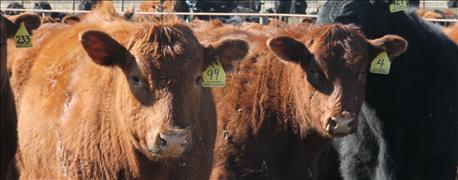March 14, 2016

The Chicago Mercantile Exchange Group’s proposal to impose a $1.50 per cwt. discount on October futures deliveries at Worthing, S.D., is drawing sharp criticism from some cattle producers in the region.
“We are is stringently opposed to the CME proposal to implement a seasonal discount to live cattle delivered to Worthing, S.D., says Todd Wilkinson, president of the South Dakota Cattlemen’s Association. Todd is a co-owner of Redstone Feeders, De Smet, S.D.

Worth $1.50 per cwt .less? The Chicago Mercantile Exchange is proposing a discount on October futures deliveries at Worthing, S.D.
The proposed discount will cost cattlemen $600 per contract. He urges producers to submit comments to the CME by Monday, March 21, the CME’s hearing deadline. The proposal and comment information can be found on the CME website: http://www.cmegroup.com/company/files/review-of-worthing-south-dakota-delivery-point-for-live-cattle.pdf
CME’s case
According background provided by the CME, it is proposing the discount to more uniformly distribute delivery on the October future’s contract among 13 sites nationwide.
CME says its data indicates that:
* Since August 2009, 50.9% of all delivered loads of cattle were originally tendered to Worthing, SD.
* 61.3% of the delivered loads of cattle associated with Worthing have been delivered to close out October futures contracts.
* Since 2009, 71.7% of delivered loads of cattle to close out October futures contracts were originally tendered to Worthing.
In a futures contract with geographically diverse delivery points – which is the case with CME Live Cattle Futures and its 13 delivery point stockyards spread between New Mexico and South Dakota – the contract should experience a broader distribution of deliveries between the delivery points than what we have seen since 2009, the CME says.
“Given the co-integrated relationship of CME Live Cattle futures prices with fed cattle spot cash prices, CME believes that it is in the best interest for the marketplace to attempt to achieve a more equal distribution of cattle deliveries across multiple delivery points,” the group’s report states. “Geographically dispersed deliveries will help ensure that expiring month prices reflect supply and demand factors across all delivery regions during all contract months, and prevent congestion at individual stockyards for USDA graders and stockyard personnel. Also, a discount applied to the Worthing, SD stockyard would not be indicative of the quality of the cattle in the region, or of the quality of the stockyard itself, but rather of a localized seasonal supply/demand imbalance.”
“Based on the cash price data, it appears that prices in the Iowa/Minnesota region during the October delivery month are consistently below cash prices in the remainder of the five area regions,” the CME announcement continues. “The CME believes that this price seasonality is due to a mix between a counter-seasonal cattle marketing schedule relative to the other 5-area regions, represented in Figure 2, and tight regional capacity based on market feedback. These factors are likely influencing the disproportional number of deliveries being tendered to Worthing, S.D., in October. Only 7.5% of Worthing deliveries have been tendered against a December contract, and so CME is not currently proposing to also discount the December contract month.
Reaction
“This CME delivery change, if enacted, is arbitrary and capricious and clearly seems to target the Midwest where the best cattle in the world are produced," said Frank Kloucek, Scotland, S.D., a cattle producer and former state lawmaker, in a press release he and two other cattlemen distributed.
"Why should our industry be punished especially after a record 45% decrease in prices in 2015," asks cow calf producer and 12-year state representative Dean Schremp, Lantry, S.D.
Bob Thullner, Herried, S.D., says "It is time the CME pays a bonus for CME deliveries of the excellent quality cattle produced here in the Midwest instead of trying to dock those cattle $600 dollars a pot load. This issue is especially important for all those cow-calf producers that are now purchasing new seed stock and semen for improved genetics for herd and harvest value performance factors that will improve all future carcass retail cuts."
"At a time when some producers are forced to contract and hedge their cattle up to a year or more in advance, true price discovery and market liquidity is crucial in the cattle market place. Punishing individuals who delivery cattle in October by $1.50 per cwt or $600 dollars per contract is not only wrong but hurts the pocket book of those who wish to protect their investment in the cattle industry," Kloucek says.
You May Also Like




